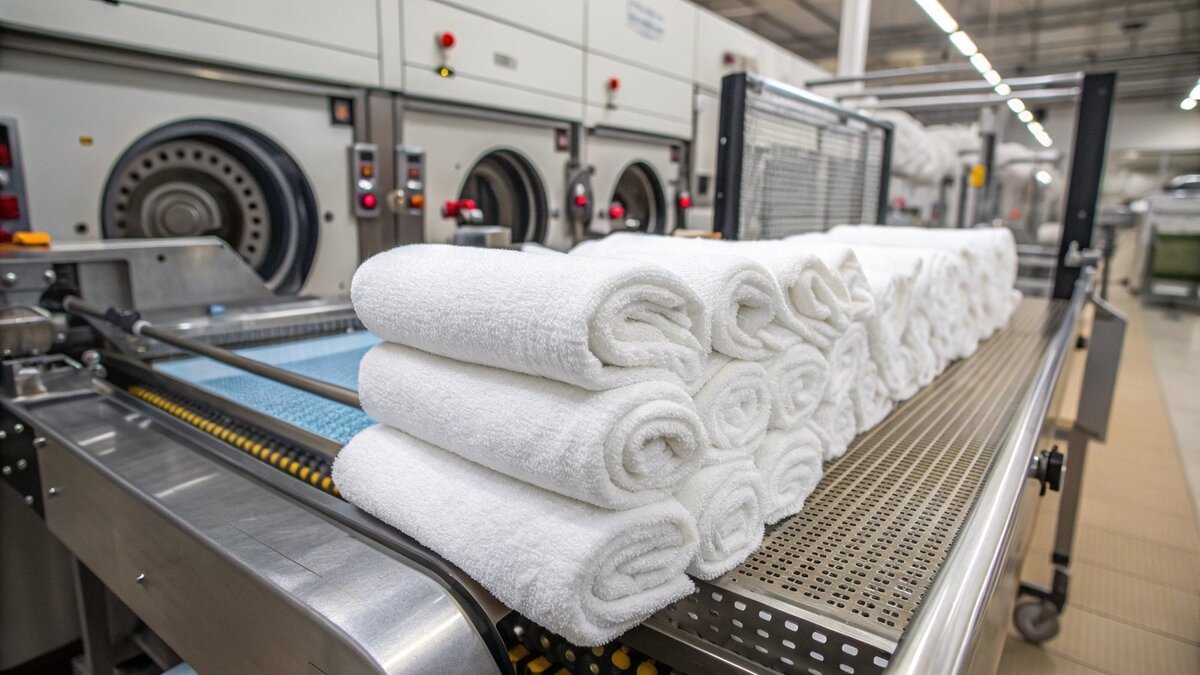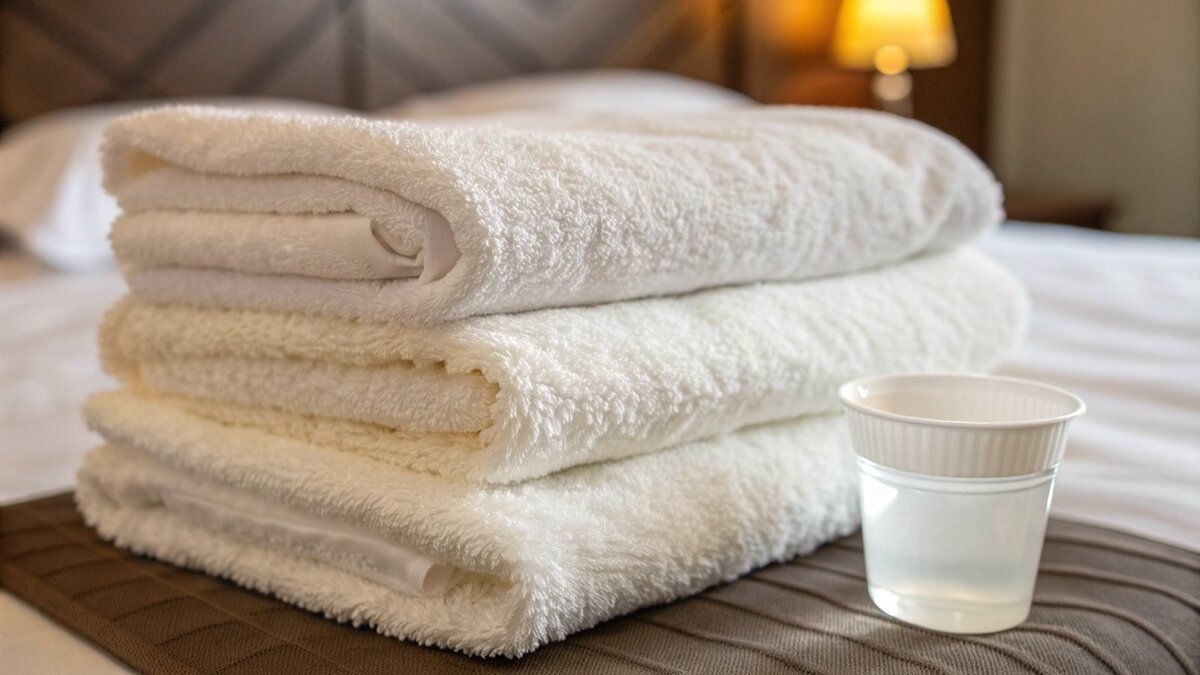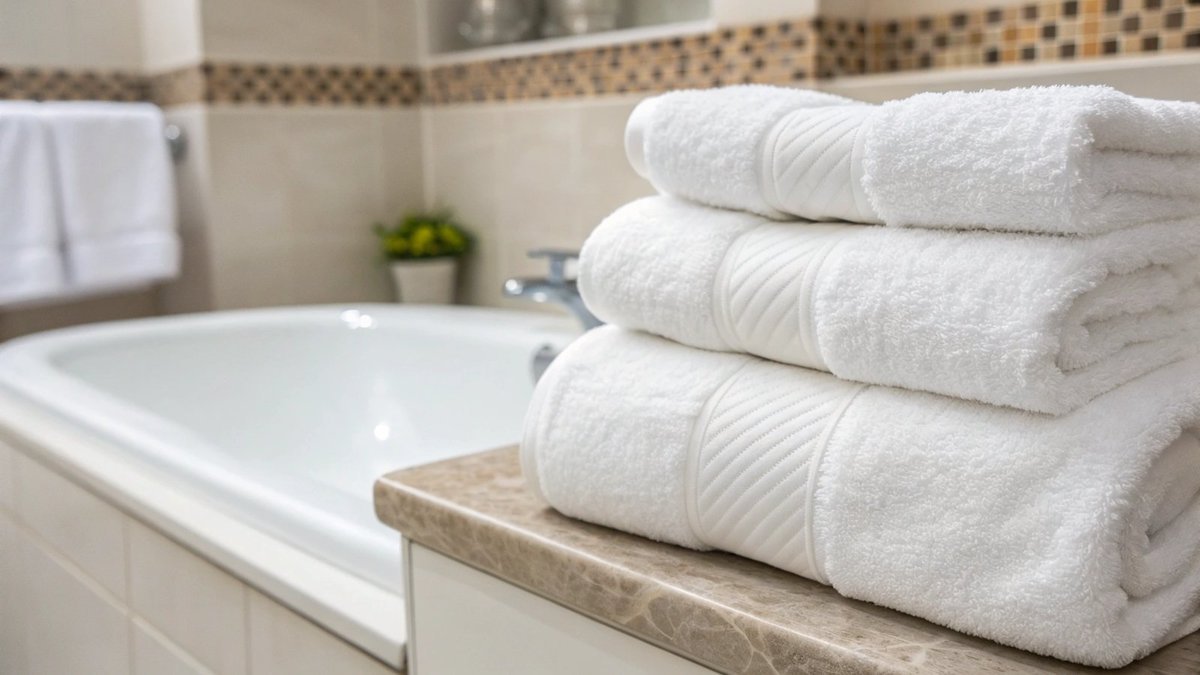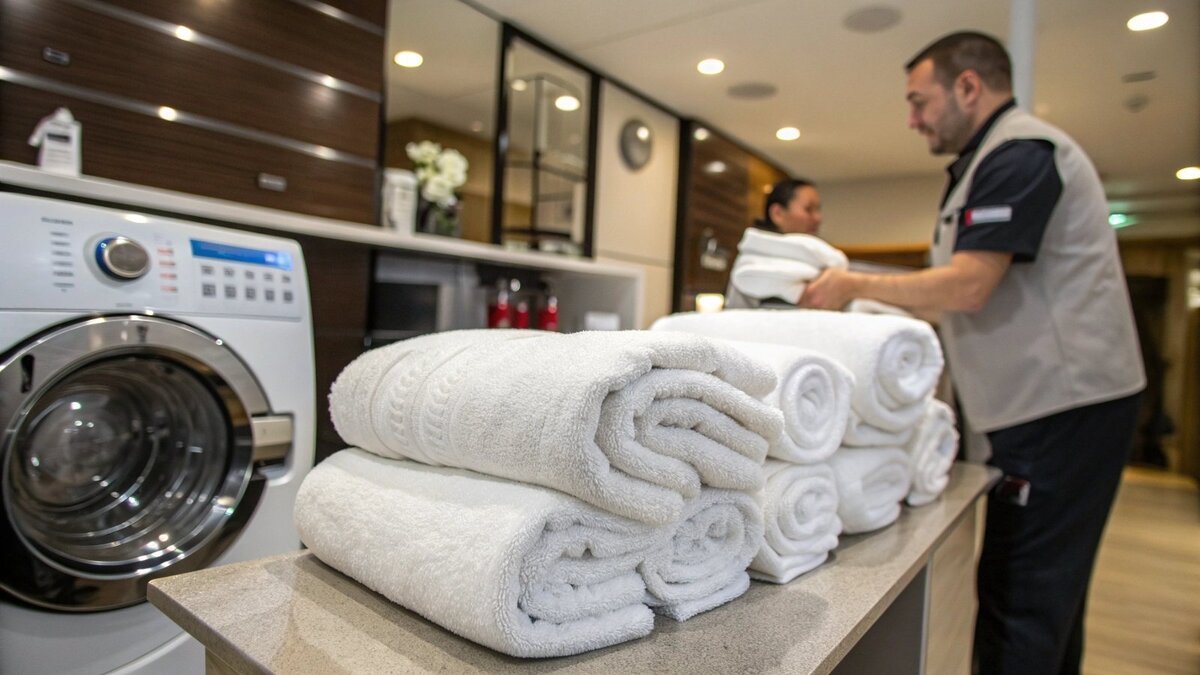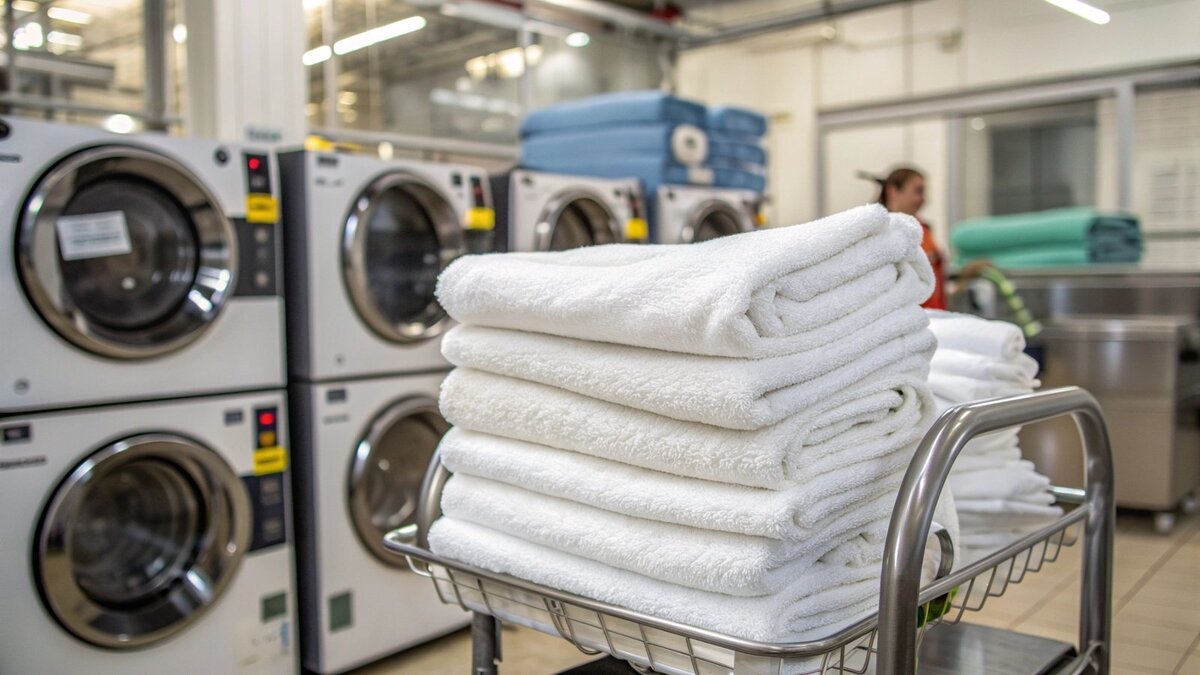That feeling of a scratchy, stiff towel is disappointing. You want that five-star hotel luxury at home or for your customers, but your towels just don’t measure up.
The secret to how hotels keep towels soft lies in a strict system. They start with high-quality 100% cotton towels, use precise washing formulas that skip fabric softeners, and follow specific drying protocols to keep the fibers plush and absorbent, wash after wash.
I’ve spent years in the textile industry, and one of the most common questions I get is about recreating that hotel towel experience. It’s not about one single trick. It’s about a combination of choosing the right materials from the start and maintaining them with professional care. These are secrets that large hotel chains have perfected, but they are not out of reach for your brand. In this post, I’ll break down the exact methods, from the laundry room chemistry to the manufacturing specs. Let’s dive into how you can achieve that same level of quality.
How do you make towels soft like hotels?
You buy expensive detergents and softeners, but your towels still come out of the dryer feeling rough. You’re just not getting that luxurious feel you want.
To make towels soft like a hotel’s, wash them in warm water with half the usual amount of detergent. Add one cup of white vinegar to the rinse cycle to strip away residue. Then, tumble dry on a medium heat setting, avoiding high heat.
Getting that signature hotel softness is more about what you don’t do. From my experience helping clients troubleshoot laundry issues, the number one culprit for stiff towels is product buildup. Commercial laundries understand this, and their process is built around keeping fibers clean and residue-free.
The Right Ingredients for Softness
Most people believe fabric softener is the key to soft towels. It’s the opposite. Fabric softeners coat cotton fibers with a waxy film. This film makes the towel feel slick at first, but it quickly builds up, flattens the loops of the towel (the ‘pile’), and destroys its absorbency. Instead, hotels use a simple, effective combination of basics.
| Step | Action | Why It Works |
|---|---|---|
| 1. Wash | Use half detergent + 1 cup of white vinegar | Detergent residue makes fibers stiff. Vinegar is a natural acid that breaks down and dissolves this buildup, leaving fibers clean and fluffy. |
| 2. Dry | Tumble dry on medium heat with wool dryer balls | High heat essentially "bakes" the cotton fibers, making them brittle and scratchy. Medium heat is gentler, and dryer balls fluff the towels and speed up drying time. |
| 3. Avoid | Fabric Softener and Dryer Sheets | Both products deposit a waxy layer on the towel, which reduces softness and makes towels less able to absorb water. |
I once consulted for a boutique hotel chain whose guest complaints about towel roughness were soaring. The problem wasn’t the towels; it was the new laundry service they hired. They were overdosing on fabric softener to "improve" them. We switched their process to a simple vinegar rinse, and the complaints vanished overnight.
How do hotels keep their towels so white and soft?
Your white towels have turned a dull grey or yellow, and they feel stiff. Standard bleach seems to make them wear out faster, not better. It feels impossible to maintain both color and texture.
Hotels keep towels white using oxygen-based bleaches, not chlorine bleach. This whitens without damaging the cotton fibers. Softness is maintained by using high-quality, long-staple cotton towels and washing methods that prevent detergent buildup.
Maintaining that pristine white look alongside a soft feel is a balancing act. It starts with the very first choice a hotel makes: the towel itself. At TowelTrend, we guide our clients to understand that the raw material is just as important as the laundry process that follows.
The Science of White and Soft
The secret to bright white towels isn’t chlorine bleach. In fact, commercial laundries and hotels avoid it for their towels. Chlorine bleach is a harsh chemical that can weaken and break down natural cotton fibers over time. It can also react with certain minerals in the water, causing towels to yellow. Instead, they rely on two key elements:
- Oxygen-Based Bleach: Products with hydrogen peroxide or sodium percarbonate are known as oxygen bleaches. They are much gentler on fabrics. They work by breaking down stains and dirt, brightening the fabric without degrading the fibers. This is the key to long-term whiteness.
- High-Quality Material: Hotels invest in towels made from 100% long-staple cotton, like Turkish or premium combed cotton. These towels have longer, smoother, and stronger fibers. This means they are naturally softer, more durable, and less likely to pill or become stiff after washing. A cheap, short-staple cotton towel will feel rough no matter how well you wash it. When we manufacture towels for hotels, this is a non-negotiable specification. The quality of the yarn determines the towel’s entire lifecycle.
What is the towel trick in hotels?
You suspect there’s a secret trick or a special product hotels use. You’ve looked for it but can’t find it. The truth is, there’s more to it than just one thing.
The "towel trick" in hotels is a complete system, not a single action. It combines sourcing durable commercial-grade towels, following a strict washing formula that avoids softeners, and adhering to a regular replacement schedule to ensure consistent quality.
For years, I’ve worked behind the scenes with hospitality clients, and I can tell you the "trick" is all about process control. It’s a highly disciplined approach that removes guesswork and prioritizes the guest experience above all else. Anyone can adopt these principles for their own brand.
Deconstructing the "Hotel Towel Trick"
The magic is in the method. It’s a three-part system that ensures every towel feels brand new to every guest.
- Industrial-Grade Sourcing: Hotels don’t buy towels from a retail store. They work with manufacturers like us to create towels to specific standards. This includes using strong, 100% cotton yarn, having double-stitched hems to prevent fraying, and choosing a specific weight (measured in GSM, or grams per square meter) that balances plushness with efficient drying times. They are built to withstand hundreds of wash cycles.
- The Scientific Wash Formula: Hotel laundry rooms look more like labs. Detergents, whiteners, and softeners (if used at all, they are specialized rinsing aids) are dispensed automatically in precise amounts. A key step is adding a "sour" agent in the final rinse. This neutralizes the pH of the fabric after alkaline detergents are used, leaving the towels feeling naturally softer and preventing skin irritation.
- Smart Drying and Handling: Over-drying is the enemy of softness. Towels are often tumbled until they are about 95% dry. They are then immediately folded while still warm. The residual heat and steam continue to work through the fibers, making them fluff up perfectly. Before they even go in the dryer, they are given a good shake to open up the pile. This simple mechanical step makes a huge difference in the final texture.
What is the hotel towel rule?
You feel there must be a set of rules hotels follow for their linens. Are towels thrown out after one stain? Replaced every year? Understanding this rule could unlock the secret to quality.
The primary "hotel towel rule" is a proactive replacement policy. Towels are retired from service after a predetermined number of wash cycles, typically 100-150 washes, not when they appear visibly worn. This ensures every guest receives a consistently high-quality towel.
This rule is all about asset management and quality control. In my role at TowelTrend, I’ve seen that the most successful hotel brands treat their towels not as simple supplies, but as a crucial part of their brand’s promise to the guest. They manage their inventory with strict, data-driven rules.
The Three Pillars of the Hotel Towel Rule
This unwritten rulebook ensures consistency across thousands of rooms and dozens of properties. It’s built on a foundation of standardization and proactive management. It’s how they guarantee a five-star experience every single time.
- Pillar 1: The Purchase Specification: A hotel doesn’t just order "white bath towels." They use a detailed specification sheet that dictates the exact cotton type (e.g., 100% combed cotton), weight (e.g., 650 GSM), size, and construction (e.g., double-stitched dobby border). Every reorder must match this spec exactly. This is the first step we take with any new private label client—we lock in their unique spec to guarantee future consistency.
- Pillar 2: PAR Level Inventory: PAR stands for "Periodic Automatic Replacement." Every hotel calculates a PAR level for its linen closets, usually 3 to 4 sets of towels per room. One set is in the room, one is in the laundry, and one or two are clean on the shelf. This rotation prevents any single towel from being overused and worn out prematurely.
- Pillar 3: The Discard Policy: This is the most critical rule. A towel’s life isn’t determined by how it looks. It’s determined by a fixed number of washes. Once a towel hits that number, it’s removed from guest circulation. It might be downgraded for staff use, used as a cleaning rag, or sent to a textile recycler. This proactive culling prevents guests from ever seeing a towel that is thin, rough, or stained. It’s a business decision that values guest satisfaction over extending a product’s life.
Conclusion
Achieving hotel-soft towels comes down to two things: starting with high-quality materials and maintaining them with a consistent, professional process. It’s a system that ensures lasting luxury.

